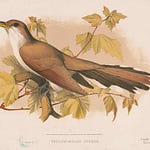We are mystified at why the Poem of the Week did not go to our free subscribers this week and are resending it now. Thanks for your patience.
Join us for Poetry Aloud (Friday podcasts) this summer, when Dr. Esolen will continue to read Huckleberry Finn, chapter by chapter, in its entirety.
You’re a young prince apparently stranded on a strange island in the Mediterranean Sea. You believe that all hands aboard your ship were lost in a terrible storm, and you think you saw the ship itself sinking to the bottom. On that ship was your father, the King of Naples. You have hardly managed to swim to shore, you are distraught and exhausted, but you hear music in the air — really, in the air or from the sea, not as if someone were singing from behind a cover, but as if the elements themselves were singing. The music is beautiful and haunting, and even though the words you hear do not console you, yet they allay the tempest in your heart. And perhaps there’s more consolation in the song than you might have supposed.
That was the context for our Word of the Week on Monday: the phrase sea change, which Shakespeare coins in this first of several songs we hear in his play of wonder, conviction of sin, repentance, and new life, The Tempest. The singer of the song is the good spirit Ariel — the name, by the way, is masculine, from Hebrew; it means “Lion of God.” We’ve met Ariel before at Word and Song, when he delivers this speech of judgment, warning, and promise to the ship’s principal “three men of sin,” one of whom is that same King of Naples. Ferdinand, the prince, is a virtuous young man who was just a little boy when their great sin was committed. The king, Alonso, conspired with his brother Sebastian, and with Antonio, the brother of the rightful Duke of Milan, to supplant that duke — whose name is Prospero, meaning, literally, “I look forward in hope.” So they smuggled him aboard a ship so leaky that even the rats have quit it, him and his baby daughter Miranda, to die at sea. The King of Naples would get a yearly payment of tribute from Milan, and Antonio would get the dukedom his ambition seeks. The name Miranda, by the way, means “she who is to be wondered at,” and it appears for the first time in this play; it too is Shakespeare’s coinage.
Alonso, Sebastian, and Antonio all deserve to die. But Prospero, who has conjured up the storm, keeps in check any inclination of his own to vengeance. The point, in fact, is that the men have already died, that is, in their sins they have broken charity with man and God. They are still breathing on this earth, though; Ferdinand doesn’t know it, but Prospero does. The question is whether they can be brought to repentance. King Alonso is the special focus. It is not that he is the guiltiest of the three. Prospero’s brother Antonio is. But as a king, he had the greatest charge to use his power for goodness, and of the three, only he has a son who he believes is now dead, and, he will come to fear, dead as a punishment to him. How to bring that man to life again? Only by a kind of death — only by being made to look into the darkness and see that you have brought it on yourself, and that the very winds and the waves in their organ-bass speak of your sin, which has cost you your son’s life.
Alonso isn’t in this scene, but his son Ferdinand is. These are the words he hears. What he is about to see is another matter. He is about to see Prospero, and, far more important, he will behold the girl Miranda, who has grown up on this island and therefore has never seen a young man in her life.
I will give the song below as it appears in the play, interrupted by Ferdinand’s reaction. Notice the motifs that seem to threaten, but that reveal, like jewels glimmering in the darkness, a promise of transformation: “Those are pearls that were his eyes.” It is as if nature herself were in the employ of a power beyond nature: and of course we who believe in God know that that is nothing but the truth. Know also that Shakespeare has included stage directions for a “burden,” meaning a bass line of music in harmony, the first time imitating the barking of dogs, and the second time the tolling of a bell. Also: the word “whist” means “silenced,” so to “kiss the wild waves whist” is to kiss them into silence. Uncanny? So it is for a dead man to come to life again.
ARIEL (singing)
Come unto these yellow sands,
And then take hands.
Curtsied when you have and kissed
The wild waves whist,
Foot it featly here and there;
And, sweet sprites, the burden bear.
Hark, hark!
The watchdogs bark.
Hark, hark, I hear
The strain of strutting chanticleer
Cry cock-a-diddle-dow.
FERDINAND
Where should this music be? In the air or the earth?
It sounds no more; and sure it waits upon
Some god of the island. Sitting on a bank,
Weeping again the King my father's wrack,
This music crept by me upon the waters,
Allaying both their fury and my passion
With its sweet air. Thence I have followed it,
Or it hath drawn me rather; but 'tis gone.
No, it begins again.
ARIEL
Full fathom five thy father lies;
Of his bones are coral made;
Those are pearls that were his eyes;
Nothing of him that doth fade
But doth suffer a sea change
Into something rich and strange.
Sea nymphs hourly ring his knell:
Hark! Now I hear them -- ding-dong bell.













Share this post